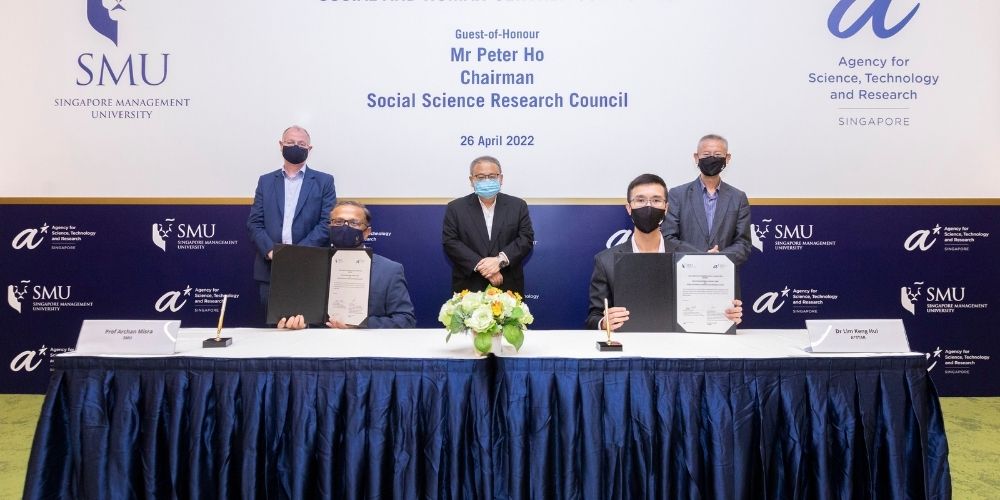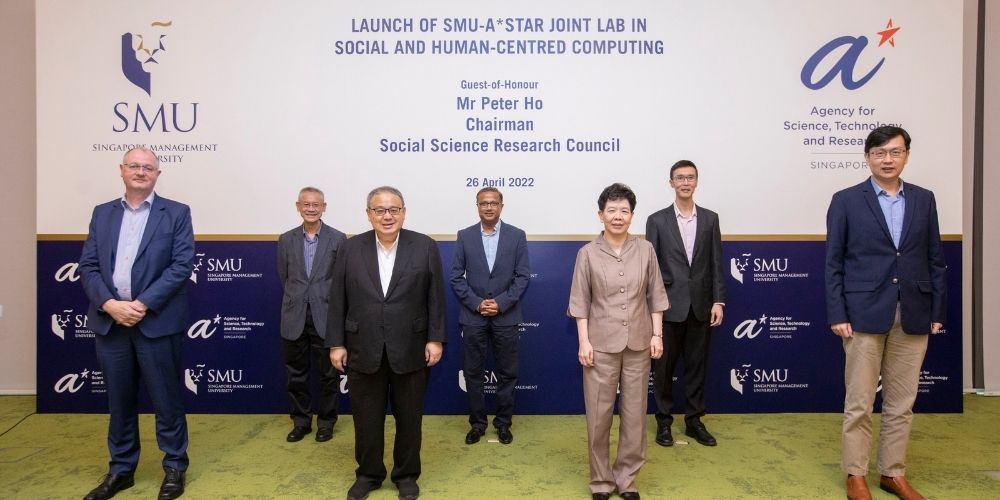Launch Of SMU-A*STAR Joint Lab In Social & Human-centred Computing
NEW SMU-A*STAR JOINT LAB IN SOCIAL & HUMAN-CENTRED COMPUTING TO TACKLE NATIONAL CHALLENGES
S$10 million joint lab integrates technology and social sciences for research outcomes that support and enhance lives in Singapore
SINGAPORE – The Singapore Management University (SMU) and the Agency for Science, Technology and Research (A*STAR) have established a Joint Lab in Social and Human-Centred Computing to build globally competitive research capabilities for Singapore to address people-centric issues in the human health and potential, and the urban solutions and sustainability domains. This multidisciplinary effort will harness complementary strengths from both organisations to conduct research that integrates social sciences and humanities disciplines with advances in computational intelligence and digital technologies. The joint lab will begin with two key research focus areas: computational social science, and human-AI synergy with a view to benefit policy-makers and social agencies, and enable the use of AI-based assistive technologies for human tasks. The capabilities developed are also relevant for industry interested in market research and understanding consumer opinion, or companies working in health and social care ranging from start-ups to multinational companies.
With a total investment of S$10 million, the joint lab will build capabilities and develop research outcomes and impactful tools that can be used to support Singapore’s public sector and industries. The joint lab will be led by co-directors Prof. Archan Misra, Vice Provost (Research), SMU, and Dr Lim Keng Hui, Executive Director of A*STAR’s Social Sciences and Technology Horizontal Technology Programme Office (SST HTPO) and the Institute of High Performance Computing (IHPC).
The joint lab was launched by Mr Peter Ho, Chairman of the Social Science Research Council (SSRC). SSRC serves as a focal point for efforts to develop talent and strengthen social science and humanities research that benefits social and economic development in Singapore and the Asian region.
Professor Timothy Clark, SMU Provost said, “The joint lab embodies both A*STAR’s and SMU’s aspiration to harness our mutual strengths to conduct research that integrates the social sciences and humanities disciplines with advances in digital technologies and computational tools. I am confident that we will be able to make multiple impactful contributions to Singapore’s Research, Innovation and Enterprise (RIE) 2025 agenda, promoting objectives such as social cohesion and successful ageing-in-place.”
Professor Andy Hor, Deputy Chief Executive (Research), A*STAR, said, “In the past, understanding human behaviour helped companies design better interfaces for technology applications. Today, we want to understand or even anticipate human behaviour by leveraging computational methods and AI for deeper insights at the individual, group and societal levels. The SMU-A*STAR joint lab combines our complementary research strengths to advance interdisciplinary R&D that can address national priorities.”
 Signing Ceremony: SMU-A*STAR Joint Lab in Social and Human-Centred Computing
Signing Ceremony: SMU-A*STAR Joint Lab in Social and Human-Centred Computing1st Row (Left to right): Prof Archan Misra, SMU; Dr Lim Keng Hui, A*STAR
2nd Row (Left to right): Prof Timothy Clark, SMU; Mr Peter Ho, Social Science Research Council; Professor Andy Hor, A*STAR;
Advancing Research in Computational Social Science and Human-AI Synergy
The first research area, computational social science, will focus on people-centric issues in adaptability, resilience, and social cohesion. This involves using computational methods to understand the factors that could affect people’s adaptability and resilience to different situations and challenges; examining the extent to which digital content (e.g. news and social media) could lead to diverging opinions and conflict among different groups of people; and exploring novel ways to identify communities of humans with deep similarities or differences in latent values or worldviews.
The second area of research in human-AI synergy will develop AI technologies that address real-life problems in ways that exceed the capabilities of AI or humans alone, and realise interactive, intelligent systems that can serve people better. A key idea in this pillar is to harness human-AI synergy to tackle real-life tasks by judiciously combining human capabilities with AI-enhanced technologies for situational understanding and assistance. Some of the initial workstreams include developing human-aware AI to assist the elderly in activities of daily living, automate wellness measures for ageing in place, as well as provide interactive digital tools for engaging seniors and promoting active living.
Other potential research areas for the joint lab include adaption to changes at work and work re-design, effective learning and transfer of skills, understanding social and psychological capital, and sustainable living amidst evolving environmental and economic challenges.
 Group photo: SMU-A*STAR Joint Lab in Social and Human-Centred Computing
Group photo: SMU-A*STAR Joint Lab in Social and Human-Centred Computing1st Row: (Left to right): Prof Timothy Clark, SMU; Mr Peter Ho, Social Science Research Council; Ms Chan Lai Fung, National Research Foundation; Mr Frederick Chew, A*STAR
2nd Row (Left to right): Prof Andy Hor, A*STAR; Prof Archan Misra, SMU; Dr Lim Keng Hui, A*STAR
Combining Multi-disciplinary Research Capabilities for Impactful Outcomes
In computational social science, SMU’s expertise in social and behaviour sciences will be combined with A*STAR IHPC’s expertise in the integration of social science with computational modelling to create new knowledge and innovative solutions. Both organisations will also harness their collective strengths in social media analysis, social psychology, network analysis, natural language processing, and AI, as well as extensive experience in research into diverse societal challenges such as media bias, polarisation and fake news across many online platforms and regions.
For human-AI synergy, A*STAR’s Institute for Infocomm Research (I2R), IHPC and SMU will combine their expertise in AI, particularly natural language processing, computer vision and cognitive AI, to develop more advanced AI algorithms for human-intent comprehension through natural verbal, visual and gestural cues. In addition, their expertise in edge computing allows the execution of more efficient AI models on small, mobile devices to enable real-time interaction and collaboration between humans and AI systems. These collective expertise in human-computer interaction will contribute to the design of human-machine interfaces to make their interactions more natural and effective in out-of-the-lab settings.
- END -
About Singapore Management University
A premier university in Asia, the Singapore Management University (SMU) is internationally recognised for its world-class research and distinguished teaching. Established in 2000, SMU’s mission is to generate leading-edge research with global impact and to produce broad-based, creative and entrepreneurial leaders for the knowledge-based economy. SMU’s education is known for its highly interactive, collaborative and project-based approach to learning.
Home to over 12,000 students across undergraduate, postgraduate professional and postgraduate research programmes, SMU comprises six schools: School of Accountancy, Lee Kong Chian School of Business, School of Economics, School of Computing and Information Systems, Yong Pung How School of Law, and School of Social Sciences. SMU offers a wide range of bachelors', masters', and PhD degree programmes in the disciplinary areas associated with the six schools, as well as in multidisciplinary combinations of these areas.
SMU emphasises rigorous, high-impact, multi- and interdisciplinary research that addresses Asian issues of global relevance. SMU faculty members collaborate with leading international researchers and universities around the world, as well as with partners in the business community and public sector. SMU’s city campus is a modern facility located in the heart of downtown Singapore, fostering strategic linkages with business, government and the wider community. www.smu.edu.sg
About the Agency for Science, Technology and Research (A*STAR)
The Agency for Science, Technology and Research (A*STAR) is Singapore's lead public sector R&D agency. Through open innovation, we collaborate with our partners in both the public and private sectors to benefit the economy and society. As a Science and Technology Organisation, A*STAR bridges the gap between academia and industry. Our research creates economic growth and jobs for Singapore, and enhances lives by improving societal outcomes in healthcare, urban living, and sustainability. A*STAR plays a key role in nurturing scientific talent and leaders for the wider research community and industry. A*STAR’s R&D activities span biomedical sciences to physical sciences and engineering, with research entities primarily located in Biopolis and Fusionopolis. For ongoing news, visit www.a-star.edu.sg.
A*STAR celebrates International Women's Day

From groundbreaking discoveries to cutting-edge research, our researchers are empowering the next generation of female science, technology, engineering and mathematics (STEM) leaders.
Get inspired by our #WomeninSTEM
